English Words in Action, Group S
(a variety of English words which have developed through history and are currently used in our modern age)
Simply click on this banner (or the following link) and you will be on your way to stimulate your brain for greater word comprehension with quizzes based on some of the words in this unit.
2. To live in a building or on land without the owner's permission and without paying to be there: The migrant workers were squatting on the vacant farm.
That family has been squatting in that house for months.
Marvin gets a squeamish feeling just at the sight of blood.
2. Relating to the condition of having an unpleasantly nervous or doubtful feeling: Shelby's brother has a squeamish attitude about walking in the city at night.3. Descriptive of someone who is easily shocked, disturbed, or disgusted: Some movies are just too unacceptable for squeamish people who can't stand looking at all of the violence and bloodshed.
4. Pertaining to a person who is afraid to deal with or to do things which might hurt or offend people: Journalists should not be squeamish about writing the truth about anyone or anything.
5. Characteristic of an individual who is easily offended or shocked by such things as violence, the mention of bodily functions, or strong language: Some talk-show hosts on the radio and TV programs upset members of their squeamish audiences who feel it is inexcusable for those hosts to use such psycho talk, vulgarisms, and personal attacks on people they disagree with.
6. Etymology: from squoymous, "disdainful, fastidious" which is from Anglo-French escoymous, of unknown origin.
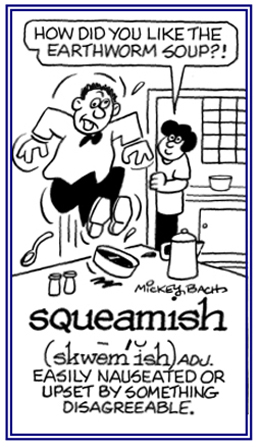
Go to this Word A Day Revisited Index
so you can see more of Mickey Bach's cartoons.
2. Any tie or deadlock; or a position in which no action can be taken resulting in a complete standoff or impasse: The national budget debate in the Senate ended in a stalemate.
The union delegates announced that there was a stalemate in the contract negotiations with the city.
2. A person, or people, who steadfastly support an organization or cause: The candidate for President had a significantly large number of stalwarts who would be voting for him in the coming election.
2. A reference to those who are very loyal and dedicated: Susan and her friends were more stalwart supporters of the politician's candidacy for governor than most of the other people in her community.
3. Etymology: from Old English staelwierthe, "serviceable, good" from stathol, "position" + wierthe, "worthy, excellent".
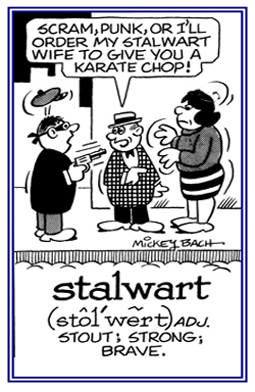
Go to this Word A Day Revisited Index
so you can see more of Mickey Bach's cartoons.
The reporter's criticism of the movie in his newspaper stands in stark contrast to the praise it has received from other viewers.
2. Etymology: from German stark, "strong".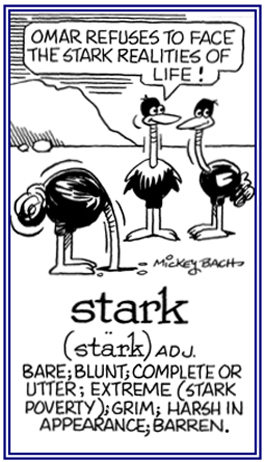
Go to this Word A Day Revisited Index
so you can see more of Mickey Bach's cartoons.
2. Etymology: from an unknown origin.
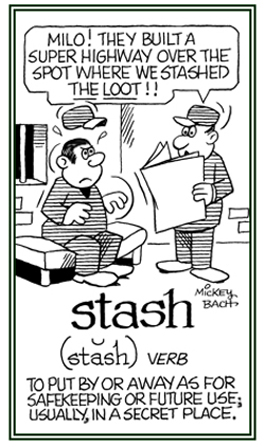
Go to this Word A Day Revisited Index
so you can see more of Mickey Bach's cartoons.
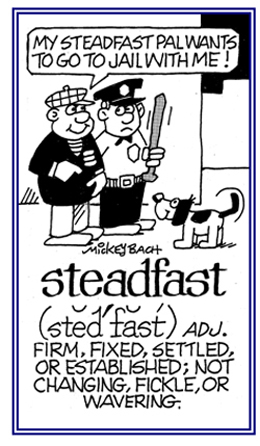
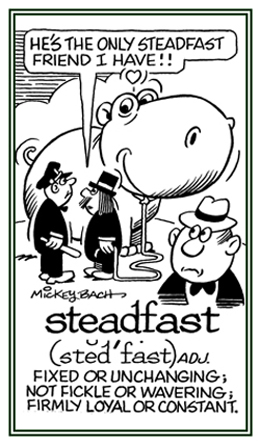
Go to this Word A Day Revisited Index
so you can see more of Mickey Bach's cartoons.
2. A person or people who have been regular participants in some activity or situation: William and David have been steadies at this office for several years.
As a result of his illness, Ron lost his normally steadier balance while he was walking and so he almost fell over.
2. Not changing as time passes; such as, not increasing or decreasing; or lasting or continuing for a long time in a dependable way: The doctor told Mildred that she had a steady heart rate.David is so much happier now that he has a steadier job.
3. Happening or developing in a continuous and normally gradual way: Shirley is making steady progress after her operation.Finally, there was a steady rain on Tuesday after such a long period without any significant rainfall.
4. Dependable or reliable: Frank's sister thanked him for being her steadiest supporter during her illness.2. To cause something to stop changing, increasing, or decreasing: Prices for food have not been steadying lately.
The new medicine has been helping to steady Aurora's heart rate.
Karin took a drink of water and sat down to steady her nerves.
Links to all of the groups of English words in action, Groups A to Z.
You may see the bibliographic list of sources of information for these words in action.


